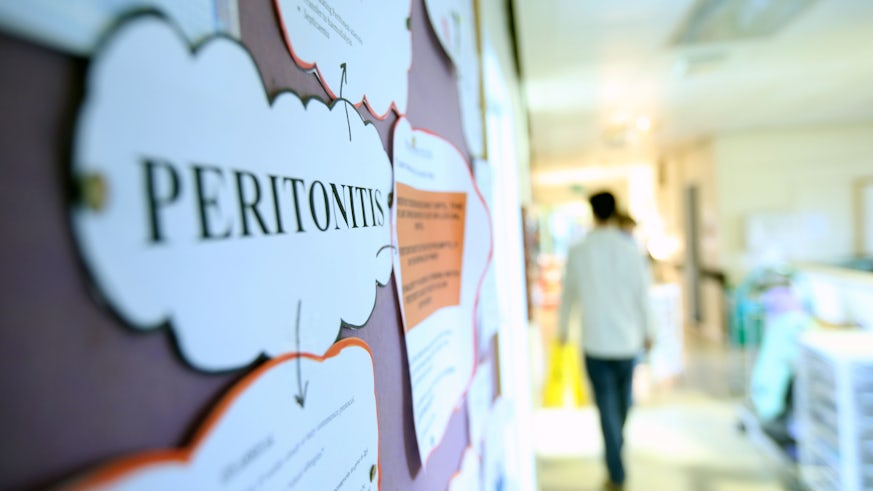Insights into inflammatory responses in dialysis patients
17 Awst 2016

A cross-disciplinary team of scientists and clinicians identifies a role for rare T cells in responding to microbes and in exerting collateral damage on surrounding tissues.
Peritonitis is a relatively frequent complication in individuals with end-stage kidney failure who depend on peritoneal dialysis (PD) as life-saving renal replacement therapy. Patients experiencing abdominal pain and a “cloudy” dialysis fluid require immediate medical attention. Infection of the peritoneal cavity and the associated inflammatory response remains a major cause of technique failure.
In collaboration with colleagues at the Wales Kidney Research Unit, the University Hospital of Wales, and the Australia and New Zealand Dialysis and Transplant Registry, Dr Matthias Eberl from the Systems Immunity Research Institute at Cardiff University led an investigation into the role of so-called unconventional T cells during peritonitis. These cells are relatively rare immune cells that are different from “normal” lymphocytes, and little is known about their role at the site of infection.

The research team studied immune responses in the abdomen and in the blood of PD patients presenting with bacterial peritonitis and monitored individuals before and during infectious episodes caused by different microorganisms.
Dr Eberl emphasised: “We are very grateful to all patients for donating samples and to the nurses and carers for supporting our research. Allowing us to have access to blood and dialysis fluid helps enormously to understand the underlying pathology and develop new treatments and tests."
Their new data that have been published in the Journal of Immunology show striking differences in the immune responses depending on the cause of the infection.
First author Dr Anna Rita Liuzzi who conducted this research within the European Training & Research in Peritoneal Dialysis (EuTRiPD) network explained: “Our data show that certain types of T cells – γδ T cells and MAIT cells – respond specifically at the site of infection when the infecting organism produces activating compounds but not when the infectious species lacks those compounds.”
Such investigations of matched pre-infection and post-infection samples in infected individuals with well-defined acute infections have not been attempted before.
Co-author Prof Donald Fraser, Director of the Wales Kidney Research Unit, concluded: “These findings have immediate diagnostic implications at the point of care, by predicting the causative organism and informing treatment long before traditional microbiological culture results become available.”
The new data offer unparalleled insights into complex immune mechanisms that underpin the clinical severity of infectious episodes, and that can be exploited to improve patient management and outcomes.
Janet Williams from the Welsh Kidney Patient Association welcomed the new study and stated: “I know many potential PD patients have a fear of contracting peritonitis and have an interest in this research.”
The study received support from Health and Care Research Wales, Kidney Research UK, the Medical Research Council and the European Commission's FP7 Programme.